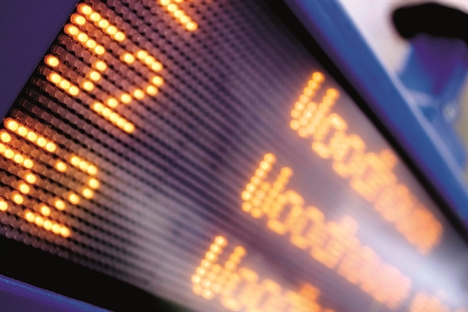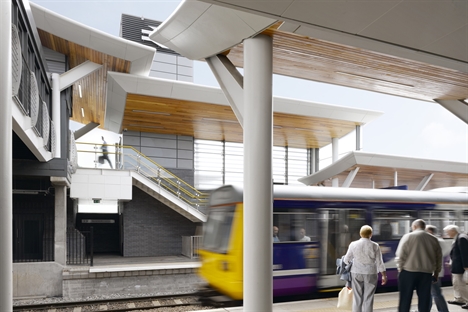01.02.15
How austerity is hitting public transport users in South Yorkshire
Source: Public Sector Executive Feb/Mar 2015
David Young, SYPTE deputy interim director general, discusses how the transport executive aims to deliver savings of £7.6m for 2015-16 and the difficulty in shielding customers from the cuts. David Stevenson reports.
At the beginning of the year, the Sheffield City Region Combined Authority passed public transport budget proposals that deliver £7.6m in savings for 2015-16.
However, despite the efforts of South Yorkshire Passenger Transport Executive (SYPTE), passengers are really starting to feel the effect of the cuts.
In the approved budget, SYPTE proposed a mix of policy changes, efficiency savings and special capital financing measures to reach a 10% reduced levy of £68.381m for 2015-16. This included using reserves and receiving a retrospective Combined Authority capital grant to provide resource for SYPTE to fund its revenue operations.
David Young, SYPTE deputy interim director general, told PSE in an interview at the organisation’s Sheffield city centre headquarters: “Our approach, first and foremost, is to minimise the impact on customers. But, unfortunately, it is not enough to deliver those internal savings and negotiated savings to deliver a balanced budget. And, therefore, we have had to look at areas that will have a direct impact on customers.”
There are four areas that SYPTE has concentrated on: disbanding its Travel Choices Team; doing less cleaning of stops and stations; scrapping paper timetables; and closing its Transport Information Centres at the Sheffield, Meadowhall, Barnsley, Doncaster and Rotherham interchanges.
Doing all this generates £2m in savings, but it will also mean the SYPTE workforce will be down 45% from 2010-11 levels, affecting up to 50 jobs.
Travel Choices Team closure
The transport budget plan was informed by SYPTE’s ‘Have Your Say!’ consultation, which got more than 1,600 responses from community groups and individuals.
“For most people, perhaps the least contentious area – apart from [for] the staff, schools and businesses involved – is the closing of our Travel Choices team. They go out and promote public transport options, and how to use public transport safely and responsibly in schools, particularly where students change from one school to another,” said Young.
Closing the team, which has been running since the 1980s, is expected to save £175,000. Six jobs will go.
Reduced cleaning
A further £700,000 is being found by cutting cleaning. The amount the cleaning contractor does at the transport interchanges will be cut by half, and on-street cleaning of bus shelters and stops will move from a monthly cycle to a three-monthly cycle.
The Doncaster interchange is dealt with separately, as it is a PFI facility.
Young said: “If you walk through the interchanges right now you’ll see they’re maintained to a very high standard. They will still be cleaned but, clearly, the standard of cleanliness will be reduced.
“If there is reported graffiti, or problems at a site, we will, as you would expect, go out and attend to that – as any responsible owner would do.”

Removing paper timetables
The PTE is saving £120,000 by scrapping paper timetables – even though nearly one in eight people consulted said they “depended” on the paper timetables, and more than half of people said they currently use and rely on them.
Young said: “There are some people who do use them and we will be forcing them to change. The large bus operators like Stagecoach and First will be producing some timetables, but not necessarily a like-for-like replacement.
“We are also making the online offer easier for people to print, download and use. It will be similar to what happens in the rail industry, where if you’re only after the peak times you can print down the selected times.”
But he added: “There are a great number of people who use public transport in the area without coming into the interchanges and survive, quite adequately, with the improved timetable information available at bus stops, on the internet and, increasingly, through real-time information that’s available at stops over your mobile phone or over Google Maps.”
Transport Information Centres
The most radical savings area is the Customer Channel Migration Programme (CCMP). This includes a re-design of the way SYPTE sells tickets and passes and provides information. It also means the closure of Transport Information Centres at all the interchanges.
Young told us: “Our way of serving customers in traditional shop models – providing them with tickets, information or approving passes – is a very old-fashioned model. It forces people to come in from where they live or work into one of the interchanges, during shop opening hours, to conduct the transactions there. It is expensive and inconvenient to customers, so we’re changing and modernising it.”
SYPTE has proposed introducing ticket kiosks and paper-based information at interchanges; training staff to be more helpful; improving online information; and promoting the Traveline number for answers by phone.
Kiosks can be used to buy smart tickets. “By the end of March, all our paper tickets will be available in electronic format through the kiosks,” said Young. The kiosks are available to use 24/7, and PSE was told SYPTE is helping customers through the change, showing them how to use the kiosks rather than asking them to work it out for themselves.
“We’re seeing a clear migration, voluntarily, from buying tickets from the shops – partly to avoid queuing – to the kiosks,” said Young. “The first week there were about 15% of people using kiosks, now it is around 55%. Many of the people who use the shops choose to, because they have to pay by cash. At the moment our kiosks are card-only, but the cash ones will come online during the course of the spring.”
Tickets will also be available at 400 community Payzone outlets – mainly newsagents and corner shops . These will be identifiable with a yellow logo outside where tickets can be bought and smartcards topped up.
“While people may not like the fact that the shops will close the challenge is, actually, helping customers change the way they do business with us,” said Young. “That’s why I say it is about service transformation. As a by-product it gives us about £150,000 saving. It’s not a lot of money, but we’re making a lot of investment in this. Next year the saving, we expect, will be around £500,000 – so there are more savings to come. This is a much more long-term gain than a quick win this year.”

These combined savings have protected SYPTE’s discretionary concessions for older and disabled people. The 70p child fare and rural, evening and Sunday bus services funded by SYPTE have also been protected by the savings plan.
Further savings
Asked whether SYPTE could deliver further savings in the future, Young told us: “I think there has to be a growing debate about the fairness of the spread of austerity cuts.
“Local authority budgets, bearing in mind PTEs are funded by them, as a proportion of central government budgets are about 7% – but about 22% of government cuts have come to local authorities. It doesn’t sound right and it certainly doesn’t feel right.
“To give you a practical example, the government obliges me to fund the English National Concessionary Travel Scheme (ENCTS). By law they have set the times, hours and eligibilities for that. When they set it up there was ring-fenced funding from central government to meet the cost. They then moved that into revenue support grants for local authorities and then removed the hypothecation and have just sliced percentage cuts off that budget. This is around 22% cuts. In fact, on revenue support grants they’re getting closer to 50% cuts in that grant funding. Clearly that funds a whole host of things, not just the ENCTS, but, for me, when revenue support grants get cut they [government] can afford to give me less but there is no relaxation in our obligations.”
Young continued: “If we keep going further it is only going to get harder. About 30% of my budget is for financial obligations, debt repayments etc; 38% is statutory ENTCS concessions; 16% is policy decisions, like funding discretionary concessions and conventional and community transport bus services; and then 15% of my budget remains to run the interchanges, park and rides, station car parks and all the staff.”
He added that “it doesn’t take a genius” to see that any further cuts will have to come out of the 15%, even though “there’s not a lot to give”.
Forward thinking
Despite the difficult financial situation, Young says that SYPTE will continue to develop and adapt the public transport offer to better connect people to jobs and training in the region. This, it is hoped, will boost the local economy, generate more jobs and create financial benefits – increased business rates etc – for South Yorkshire.
“And I can see a time, in the not too distant future, when we may be entirely dependent on that type of funding if austerity goes its fullness,” said Young. “We may have to consider such ways of being self-funded.”
Tell us what you think – have your say below or email [email protected]